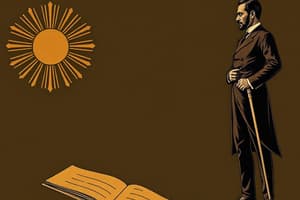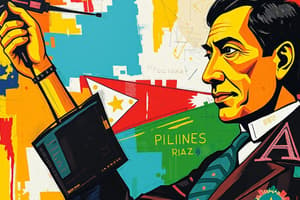Podcast
Questions and Answers
What was the main objective of Senate Bill No. 438?
What was the main objective of Senate Bill No. 438?
- To limit the freedom of speech and religion
- To remove Rizal's heroic legacy
- To promote the Catholic Church
- To disseminate the ideals and values of Rizal through the reading of his works (correct)
What was the Catholic Church's concern about the bill?
What was the Catholic Church's concern about the bill?
- It would harm the Catholic faith (correct)
- It would remove Rizal's heroic legacy
- It would promote nationalism
- It would limit the freedom of speech and religion
Who sponsored the Senate Bill No. 438 on April 17, 1956?
Who sponsored the Senate Bill No. 438 on April 17, 1956?
- Jose P. Laurel (correct)
- Mariano J. Cuenco
- Senator Claro M. Recto
- Francisco Rodrigo
What was the argument of the senators who opposed the bill?
What was the argument of the senators who opposed the bill?
What was Francisco Rodrigo's stance on Rizal's heroism?
What was Francisco Rodrigo's stance on Rizal's heroism?
What was the accusation of the opponents of the bill?
What was the accusation of the opponents of the bill?
What was the main concern of the Catholic Bishops’ Conference of the Philippines regarding the bill?
What was the main concern of the Catholic Bishops’ Conference of the Philippines regarding the bill?
How many passages in Noli me tangere were considered anti-Catholic?
How many passages in Noli me tangere were considered anti-Catholic?
What was the result of the compromise reached on May 9, 1956?
What was the result of the compromise reached on May 9, 1956?
What was the basis of Senator Recto’s argument in defending the bill?
What was the basis of Senator Recto’s argument in defending the bill?
Who offered an exemption for students who had religious objections to reading Rizal’s works?
Who offered an exemption for students who had religious objections to reading Rizal’s works?
What was the purpose of requiring the reading of Noli me tangere and El filibusterismo in public and private schools?
What was the purpose of requiring the reading of Noli me tangere and El filibusterismo in public and private schools?




